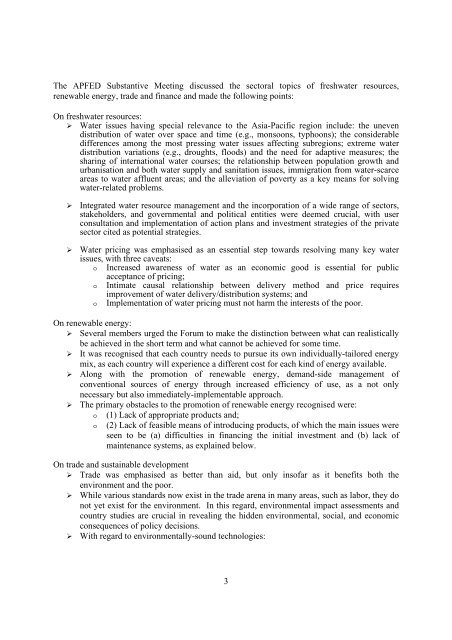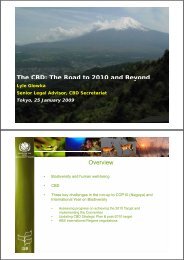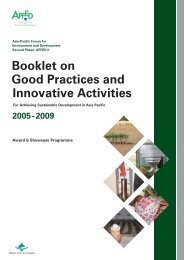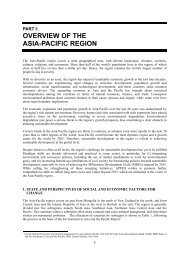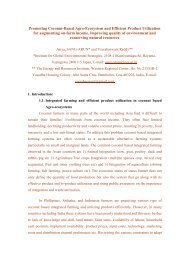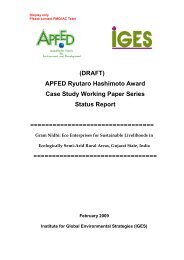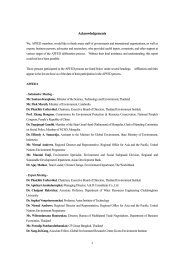Summary of Discussion Points Made in Previous APFED Meetings ...
Summary of Discussion Points Made in Previous APFED Meetings ...
Summary of Discussion Points Made in Previous APFED Meetings ...
Create successful ePaper yourself
Turn your PDF publications into a flip-book with our unique Google optimized e-Paper software.
The <strong>APFED</strong> Substantive Meet<strong>in</strong>g discussed the sectoral topics <strong>of</strong> freshwater resources,<br />
renewable energy, trade and f<strong>in</strong>ance and made the follow<strong>in</strong>g po<strong>in</strong>ts:<br />
On freshwater resources:<br />
‣ Water issues hav<strong>in</strong>g special relevance to the Asia-Pacific region <strong>in</strong>clude: the uneven<br />
distribution <strong>of</strong> water over space and time (e.g., monsoons, typhoons); the considerable<br />
differences among the most press<strong>in</strong>g water issues affect<strong>in</strong>g subregions; extreme water<br />
distribution variations (e.g., droughts, floods) and the need for adaptive measures; the<br />
shar<strong>in</strong>g <strong>of</strong> <strong>in</strong>ternational water courses; the relationship between population growth and<br />
urbanisation and both water supply and sanitation issues, immigration from water-scarce<br />
areas to water affluent areas; and the alleviation <strong>of</strong> poverty as a key means for solv<strong>in</strong>g<br />
water-related problems.<br />
‣ Integrated water resource management and the <strong>in</strong>corporation <strong>of</strong> a wide range <strong>of</strong> sectors,<br />
stakeholders, and governmental and political entities were deemed crucial, with user<br />
consultation and implementation <strong>of</strong> action plans and <strong>in</strong>vestment strategies <strong>of</strong> the private<br />
sector cited as potential strategies.<br />
‣ Water pric<strong>in</strong>g was emphasised as an essential step towards resolv<strong>in</strong>g many key water<br />
issues, with three caveats:<br />
o Increased awareness <strong>of</strong> water as an economic good is essential for public<br />
acceptance <strong>of</strong> pric<strong>in</strong>g;<br />
o Intimate causal relationship between delivery method and price requires<br />
improvement <strong>of</strong> water delivery/distribution systems; and<br />
o Implementation <strong>of</strong> water pric<strong>in</strong>g must not harm the <strong>in</strong>terests <strong>of</strong> the poor.<br />
On renewable energy:<br />
‣ Several members urged the Forum to make the dist<strong>in</strong>ction between what can realistically<br />
be achieved <strong>in</strong> the short term and what cannot be achieved for some time.<br />
‣ It was recognised that each country needs to pursue its own <strong>in</strong>dividually-tailored energy<br />
mix, as each country will experience a different cost for each k<strong>in</strong>d <strong>of</strong> energy available.<br />
‣ Along with the promotion <strong>of</strong> renewable energy, demand-side management <strong>of</strong><br />
conventional sources <strong>of</strong> energy through <strong>in</strong>creased efficiency <strong>of</strong> use, as a not only<br />
necessary but also immediately-implementable approach.<br />
‣ The primary obstacles to the promotion <strong>of</strong> renewable energy recognised were:<br />
o (1) Lack <strong>of</strong> appropriate products and;<br />
o (2) Lack <strong>of</strong> feasible means <strong>of</strong> <strong>in</strong>troduc<strong>in</strong>g products, <strong>of</strong> which the ma<strong>in</strong> issues were<br />
seen to be (a) difficulties <strong>in</strong> f<strong>in</strong>anc<strong>in</strong>g the <strong>in</strong>itial <strong>in</strong>vestment and (b) lack <strong>of</strong><br />
ma<strong>in</strong>tenance systems, as expla<strong>in</strong>ed below.<br />
On trade and susta<strong>in</strong>able development<br />
‣ Trade was emphasised as better than aid, but only <strong>in</strong>s<strong>of</strong>ar as it benefits both the<br />
environment and the poor.<br />
‣ While various standards now exist <strong>in</strong> the trade arena <strong>in</strong> many areas, such as labor, they do<br />
not yet exist for the environment. In this regard, environmental impact assessments and<br />
country studies are crucial <strong>in</strong> reveal<strong>in</strong>g the hidden environmental, social, and economic<br />
consequences <strong>of</strong> policy decisions.<br />
‣ With regard to environmentally-sound technologies:<br />
3


